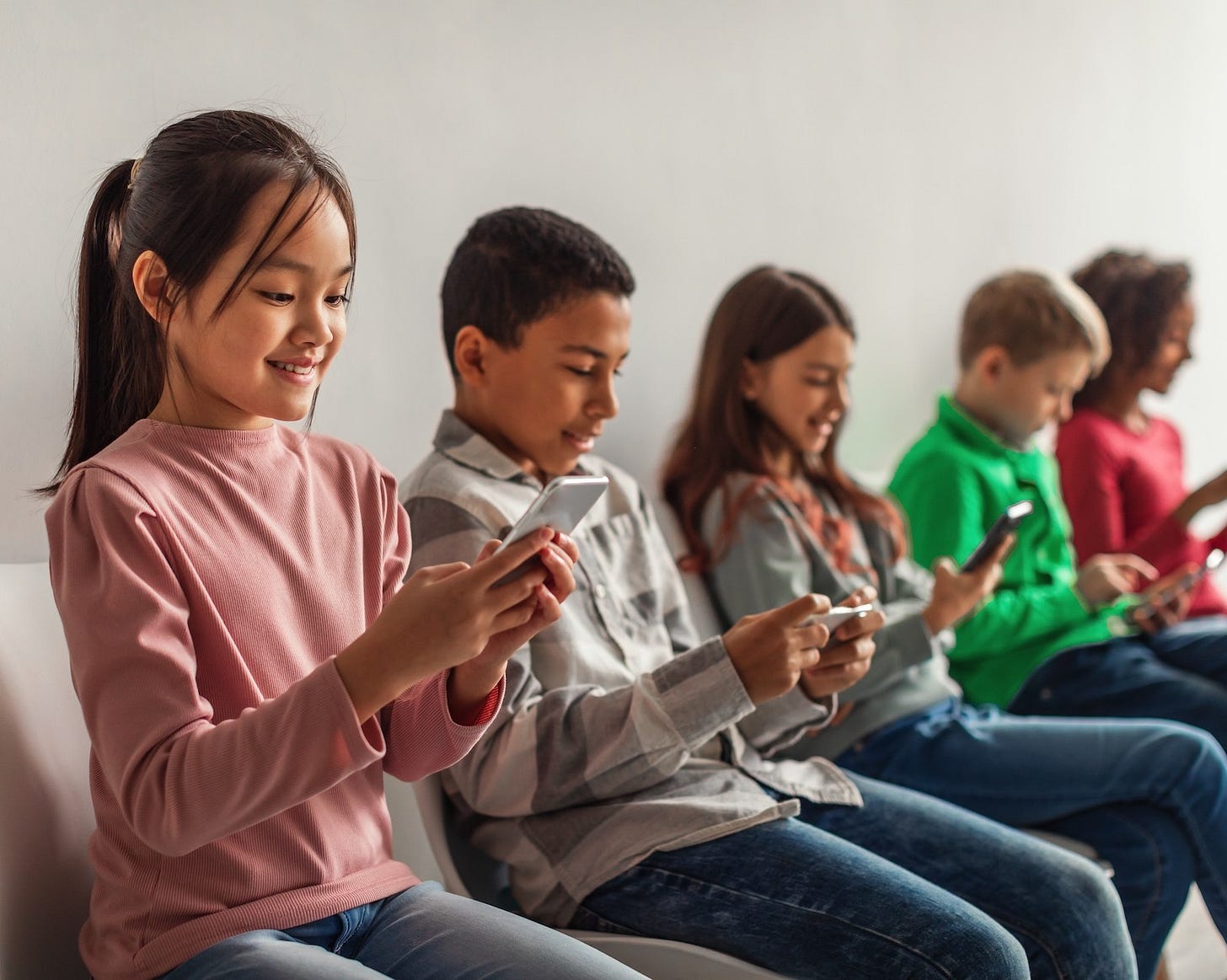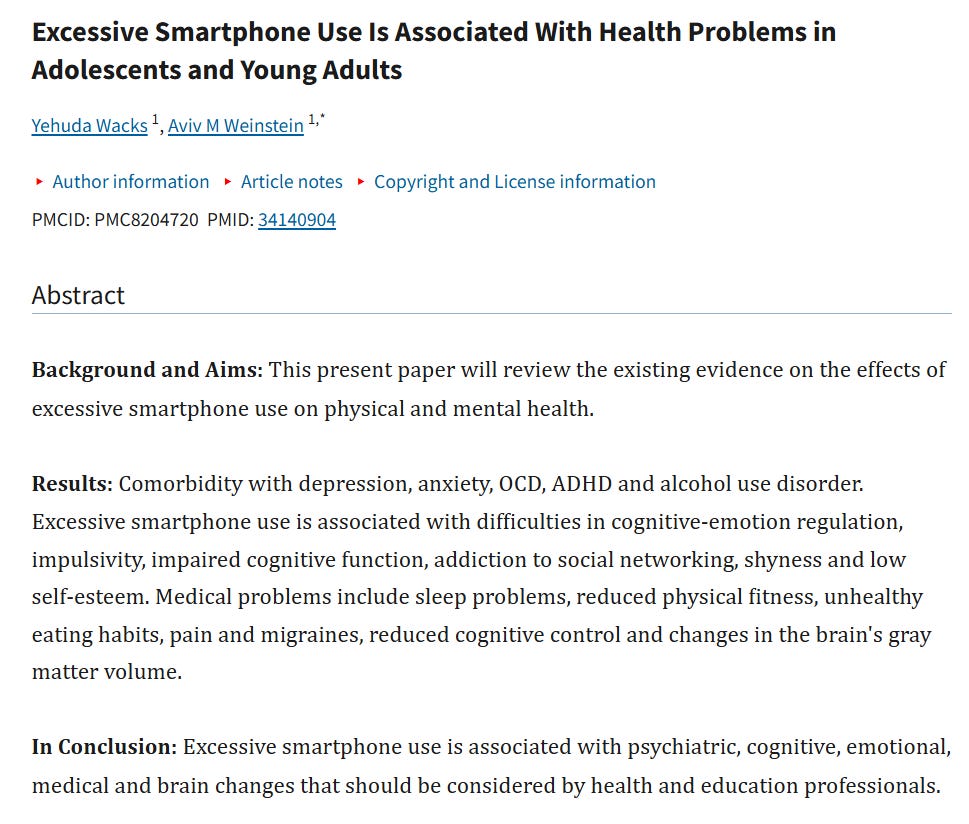RFK to Ban Cell Phones in Schools? Is This Good or Bad?
Does cellular phone use increase cancer risk? Great question!
Do you agree that cell phones should be banned in schools?
On the surface, I say yes, cell phones shouldn’t be used by kids under, say, 14 in schools. That said, I also don’t believe the government should be making decisions like this. What might be better is a mass education campaign that alerts the public to the potential hazards. As a hard-core libertarian/anarcho-capitalist, I believe the government needs to stay out of our lives. If we’re going to have a government as corrupt as it is, the purpose should be to protect life, property, and liberty. One could argue that a cell phone ban protects life, but you could also say that banning cars protects life. Where does it stop? Should the government ban airlines due to excessive radiation exposure? Should they ban sports because kids get hurt? No!
I like that this subject is getting more attention because of Bobby, but ultimately, the decision should be up to parents. Perhaps it’s a good idea to ban phones in classrooms, and I am pretty sure this is already the case in most schools. We home-school two of three of our boys. My 13-year-old is in a public school (he will homeschool again next year) and isn’t allowed to have his phone in class. I like the fact that he has a phone so that I can communicate with him in an emergency (since we live 15 miles from the school), but we have to be vigilant in making sure the damn thing isn’t overused.
Is Cell Phone Use Harmful To Kids?
There is no question in my mind that cell phones are harmful for various reasons. Let’s get into cancer risk later in the article and focus first on the social damage being done.
Teens who are addicted to their phones are more likely to engage in bad behavior. 22% of teenage girls and 18% of teenage boys have sexted before, and this is probably accentuated by cell phone addiction. Cell phone addictions can also make kids more vulnerable to cyberbullying and online predators. Almost 43% of kids have been cyberbullied, and 87% of kids have admitted that they have been mean or cruel to someone else on the internet. Regarding online predators, there are around 750,000 of them online every day. Around 20% of teenagers will receive unwanted sexual solicitation from the internet, and phones are a significant medium for this through social media. Here are some more alarming statistics.
Cell Phones and Cognition/Depression
The convenience of cell phones and the lure of endless ‘entertainment’ at a child’s fingertips are destroying an entire generation. Kids can no longer read maps or remember phone numbers. There is instant access to AI that can now write papers and do math for kids. You can walk into a room full of teenagers, and they won’t be interacting with one another; they’ll all be staring at their screens. Kids are becoming socially retarded because they lack the proper stimulation that in-person interactions and conversations provide. They get a massive dopamine rush due to the instant satisfaction of cell phone games and social media. Cell phones are addictive, and kids are having a hard time putting them down.
Phones are exposing kids to harmful content and mental health risks. The stuff kids see on their smartphones, especially social media, is a real emotional roller coaster. They’re bumping into some pretty heavy content, such as creepy messages from strangers and posts about suicide and eating disorders. This exposure is more than disturbing; it can escalate their anxiety, alter their mood, and even lead to long-term mental health issues.
There are likely many reasons why rates of depression are skyrocketing in kids, but the use of cell phones is a major culprit. At least 36% of children have experienced severe depression, and the 11-17 age group has the highest rates of depression. This is truly unbelievable and cause for alarm.
Many studies have been done which definitively link cell phone usage with depression.
Phones are diminishing real-world interactions and relationships. NPR reports that smartphones and apps are like crack for kids’ brains. This tech addiction often gets in the way of chatting with family, playing outside, or actual human contact. It’s not just about missing a family dinner. It’s about losing touch with how to interact, empathize, and be a person outside those screens.
Cell phone use also disrupts sleep and contributes to a sedentary lifestyle. The dang things are also interrupting quality sleep. The blue light from screens decreases melatonin production, which leads to poor-quality sleep.
We’ve all likely seen the destruction of person-to-person interpersonal relationships because of cell phones. People no longer want to meet in person; instead, they would rather text you. Even speaking on the phone is out of style for many younger adults. The hassle of actually having to speak to you on the phone is too much to ask for, so a text that is exponentially less personal is more convenient for them. For some people, texting allows them to ignore you and put you off until later, more easily.
I firmly believe all of this was by design. The globalists want an isolated and apathetic population hooked on electronics and depleted of real human interaction, and the cell phone gave them the perfect tool to advance this idea.
Cellular Phones and Cancer Risk
Of course, there are conflicting reports on whether cellular phones increase cancer risk, and most mainstream media outlets will tell you that they don’t increase risk or that the evidence isn’t clear. The same is true with so much when you look at several different health issues. According to the ‘authorities,’ fluoride in the water isn’t just harmless; it’s good for you. Vaccines are great! Food dyes are fine! Aspartame is healthy, and so on. These so-called expert authorities cannot be trusted.
First, let’s look at what WebMD says about cell phones and cancer risk.
“More than 310 million people in the U.S. now use cell phones, and more than 7.1 billion use them worldwide. People are making more calls each day, and these calls last longer. These are some of the reasons people worry that cell phones might be bad for their health.
But are they really? Here's what some expert agencies have to say:
The FDA says that neither research results nor public health statistics have clearly shown that normal use of cell phones raises the risk of cancer.
The International Agency for Research on Cancer says the radiation from cell phones is "possibly" a cancer-causing substance.
The CDC says science hasn't given us a definite answer and more research is needed.
The bottom line is that no one can say for sure right now whether there's a link between cell phones and cancer. Decades of studies have led to conflicting results. And scientists are still studying the issue.”
So, they do say there is a possible risk, which is a few words shy of the truth.
Let’s take a look at some studies, shall we?
In a study titled Cellular Phone Use and Risk of Tumors: Systematic Review and Meta-Analysis, researchers conclude, “Further, cellular phone use with cumulative call time more than 1000 h statistically significantly increased the risk of tumors. This comprehensive meta-analysis of case-control studies found evidence that linked cellular phone use to increased tumor risk.”
In a study titled Cellular Phone Use and Risk of Tumors: Systematic Review and Meta-Analysis, researchers conclude, “In sum, the updated comprehensive meta-analysis of case-control studies found significant evidence linking cellular phone use to increased tumor risk, especially among cell phone users with cumulative cell phone use of 1000 or more hours in their lifetime (which corresponds to about 17 min per day over 10 years), and especially among studies that employed high quality methods. Further quality prospective studies providing higher level of evidence than case-control studies are warranted to confirm our findings.”
An article on Cancer.org said the following: “The 13-country INTERPHONE study, the largest case-control study done to date, looked at cell phone use among more than 5,000 people who developed brain tumors (gliomas or meningiomas) and a similar group of people without tumors. Overall, the study found no link between brain tumor risk and the frequency of calls, longer call time, or cell phone use for 10 or more years. There was a suggestion of a possible increased risk of glioma, and a smaller suggestion of an increased risk of meningioma, in the 10% of people who used their cell phones the most.”
After basically saying there is no increased risk of cancer with cell phone use, they say there’s a possible link to an increased risk of gliomas. The rate of gliomas has increased drastically over the last couple of decades and corresponds with the increased adoption of cell phone use. Regular use of a cell phone by adults can significantly increase the risk of gliomas by 40% with 1640 hours or more of use (this is about one half hour per day over ten years).
There are many different ways that radiation from cell phones can cause cancer. This article describes 44 mechanisms for possible increased cancer risk.
Unfortunately, we’ve all become reliant on the convenience of cell phones, if not addicted. There are ways to lessen the cancer risk! Gunnar and I used an electromagnetic frequency (EMF) monitor to test the levels of EMF being emitted by our phones. We found that the levels increase drastically when Bluetooth is active on our phones. Turning off your Bluetooth when you are not using it is an excellent idea. My new phone does not have a headphone jack, so I had to purchase a Bluetooth device that I can keep several feet away from my head while using corded headphones. It’s a little inconvenient, but not as inconvenient as brain cancer. I try my best not to use Bluetooth headphones. When I talk on the phone, I always use a speaker phone and keep the phone as far away from my head as possible. Do you have any tips to reduce our risk? If so, let us know in the comments.
In conclusion, I believe ‘the science’ provides evidence that cell phone use increases cancer risk. Cell phone use in kids is also not good for a variety of reasons.
I don’t believe the government should be involved in deciding whether or not children should have access to cell phones in schools. This responsibility should be placed on the parents’ shoulders.











